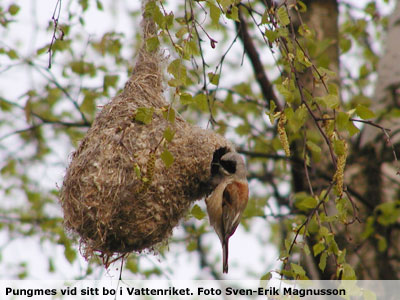Meet the polygamous birds that don’t hang around

University of Bath Press Release, December 2011
Researchers from the University of Bath and the University of Groningen have established a mathematical model that goes some way to explain the very strange mating behaviour of the tiny Penduline tit. This misbehaving European bird has a unique attitude to relationships, often resulting in fertilised eggs being abandoned and partners being ‘divorced’.
The male of the species starts the mating process by building an extremely sophisticated nest that hangs, like a pendulum, between forked tree twigs.
However, in a move that human men may sympathise with, the male bird leaves the finishing touches of the nest until a potential mate arrives. He uses the good nest foundations that he has built to lure her in, and then works with her to complete the dwelling to her specifications.
After completing the nest together, which can take up to two weeks and is lined with a couple of centimetres of soft cushioning to keep the eggs warm, in what appears a heartless move either the male or the female will ‘divorce’ its partner and abandon the nest. In about 30% of all cases, the male and the female both abandon the nest, even though the eggs are fertilized and ready to hatch.
Scientists have been baffled by this strange behaviour for decades, but now researchers have established a model that helps to explain the bird’s callous behaviour.
Professor Franjo Weissing, from the University of Groningen’s Centre of Ecological and Evolutionary Studies, has led the research. He said: “There is no logic to decide which parent leaves the nest; before this project all we knew for sure was that on no account did both parents stay and rear the young.
“Both parents have the same capabilities when it comes to raising their offspring, so the gender of the remaining bird makes no difference to the welfare of the chicks. The parent that leaves the nest will usually go on to mate again, with each ‘divorcing’ parent taking up to four or five new mating partners during a four month season!”
In order to explain the strange mating behaviour of the birds the researchers looked to calculate whether there was a biological benefit to either parent staying with the nest while the other left.
Professor Weissing said: “We tried to calculate how many offspring were produced in each circumstance - when the mother left, when the father left, or when both parents left the nest. However, because the bird that leaves can go on to have additional breeding partners during the course of the season, simple mathematical calculations aren’t possible.”
This complication led the researchers to explore game theory models - a mathematical method for analysing calculated circumstances where an individual’s success is based upon the choices of others.
University of Bath PhD research student Dr Rene van Dijk, now postdoctoral fellow at the University of Sheffield, tested the game theory models against the birds’ behaviour.
Dr van Dijk said: “The most applicable game to the birds mating behaviour was the ‘snowdrift game’ - used widely to explain the evolution of human cooperation.
“The game states that in a snowdrift, if two vehicles were stuck and their survival depended on them tunnelling to reach one-another, each would have equal gain from the digging of a tunnel. However each could also wait until the other party dug the tunnel, therefore eliminating any personal effort while maintaining their claim to the benefit.
“The behaviour of the birds is somewhat similar to this - they each gain genetically from breeding, but each bird could also gain from leaving this nurturing stage to their partner and instead start breeding again with another bird. We used the model to predict the behaviour of a population of birds and on measuring the observed reality we found it to be very similar.
“The birds therefore gamble on whether or not the other parent will stay with the offspring and raise them. The parent that remains puts in the most effort and loses out on the opportunity of further breeding during the season, but both parents gain a benefit.
“In some cases the gamble doesn’t pay off, with both parents leaving after the eggs are laid resulting in the nest being unsuccessful. However both parents are making the gamble that during a whole breeding season, some of their partners will make the decision to stay with the nest when they move on.”
Professor Weissing added: “The real beauty of this project was in demonstrating that not only can we use this method to develop a scientific understanding of animal behaviour, but that we can do this in situations where the particular behaviour appears to be quite simply crazy. Having proven that this technique works there are wide potential applications for further studies.”
The research was carried out in collaboration with the University of Bristol and the Eotvos Lorand University in Hungary. Findings have been published this week in the journal ‘Proceedings of the Royal Society: Biological Sciences’.
More information: prof. Franjo Weissing, tel. +(0)50-3638669/2131; f.j.weissing@rug.nl
| Last modified: | 24 August 2021 3.30 p.m. |
More news
-
07 April 2025
Plastic recycling: how to best reuse carbon atoms
Scientists at the University of Groningen are working on new ways to recycle plastic waste into new, high-quality products.
-
07 April 2025
Gratama Jubilee gift for Marleen Kamperman and Marijke Leliveld
Prof. Marleen Kamperman and Marijke Leliveld received EUR 100,000 from the Gratama Foundation for their research project aimed at producing organic textiles for sustainable fashion.
-
03 April 2025
IMChip and MimeCure in top 10 of the national Academic Startup Competition
Prof. Tamalika Banerjee’s startup IMChip and Prof. Erik Frijlink and Dr. Luke van der Koog’s startup MimeCure have made it into the top 10 of the national Academic Startup Competition.
